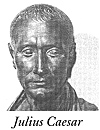 After Caesar's brilliant victory in Africa
at the Battle of Thapsos in 46 BCE, the Roman
Army returned to Italy to bask in the accolades
for its victory and enjoy a well-deserved rest.
After Caesar's brilliant victory in Africa
at the Battle of Thapsos in 46 BCE, the Roman
Army returned to Italy to bask in the accolades
for its victory and enjoy a well-deserved rest.
Julius Caesar
Although the combined Pompeian- Numidian army had suffered heavy losses at Thapsos, it was far from completely destroyed. Eventually, many of the survivors made their way to Spain.
The Romans had a sizable garrison in Iberia. Caesar left about 30,000 of his men in Spain after the Ilerda campaign in May of 49 BCE, spread out among the key cities of Spain. Yet within a year the two sons of Gnaeus Pompeius (Pompey the Great) had gathered an army in excess of 60,000 men and were prepared to challenge Rome for control of the Iberian peninsula.
Now realizing the danger, Caesar quickly assembled a few thousand of his most trusted veterans to form the core of a weary army that had already spent three years away from home. The Caesarians sailed for Spain, landed in early January 45 BCE, and set off in search of the rebels. They did not have far to look. Within a few weeks they located an enemy army of 50,000 men led by Gnaeus Pompey in the vicinity of Cordova.
By moving swiftly, Caesar hoped to bring Gnaeus to battle and destroy his army before he had a chance to gather reinforcements or find good defensive terrain. However, Gnaeus the Younger and Sextus had chosen Titus Labienus as their field commander. Labienus had been one of Caesar's generals before he allied with Pompey the Great, and had demonstrated tremendous military prowess during the Battle of Ruspina, Tunisia. Knowing that Caesar needed a quick victory, the wily general would not allow himself to be lured into battle.
Labienus retreated southward, allowing his rear guard units to keep the pursuing Romans off balance. All the while the Pompeians were heading back toward their base of supply, and Labienus was looking for a piece of ground that would give him an advantage in battle with the Romans. Finally, on 17 March, Labienus placed his forces on a series of formidable hills near the Aguilar River and prepared to fight the Caesarians for control of Iberia.
Although the Pompeians were well placed in superior defensive positions by the time Caesar and his legions arrived, he ordered an immediate attack. Led by the experienced veterans, the army executed a daring but unimaginative frontal up-hill attack. Although the Pompeians held the advantage, Caesar was convinced that his aggressive troops could close with and destroy the rebels. Despite initial enthusiasm, the advance soon halted. Battered and stunned by the strength of the defense, the Caesarians were in the process of regrouping into regular battle formations when Gnaeus and Labienus led the defenders forward in a vicious counterattack.
The unexpected charge slammed into the center of the enemy line and almost succeeded in breaking through. Caesar saw his men wavering, and knew that he had only minutes before the line broke and panic swept over his army. He ordered both flanks to advance and then personally rushed into the center of the line and took command. The Roman veterans, seeing their great leader in the thick of the battle, redoubled their efforts to defeat the enemy. The situation remained in doubt for several hours as both sides fought for their lives.
Finally, the renewed Caesarian offensive on both flanks and the stubborn resistance in the middle began to tell. Slowly, almost imperceptibly, they began to inch forward up the hill and the Pompeian center began to waiver. Finally, the Caesarians burst through the enemy line and effectively cut it in half. Panic quickly spread through the Pompeian army as the soldiers desperately tried to find a way to escape. The battle turned into a rout and then a massacre as the Caesarians slaughtered over 30,000 Pompeians during the final hours of the battle while suffering 1,000 dead and 5,000 wounded. Labienus was killed fighting, and Gnaeus was caught fleeing; he was later executed. His brother Sextus escaped and joined the remnants of the piratical Pompeian fleet in the Mediterranean.
Caesar emerged victorious from one of the most difficult battles of his long military career. He had underestimated the enemy and overestimated the ability of his own troops. In so doing he had come within a whisker of losing the battle, control of the Iberian Peninsula, and perhaps even Rome.
Battle Briefs
- Marine Recon 1995
AC 130 Spectre Gunship
The River of Death: The Battle of Munda 45BC
Munda Ancients Scenario
Back to Table of Contents Competitive Edge # 6
Back to Competitive Edge List of Issues
Back to Master Magazine List
© Copyright 1995 by One Small Step, Inc.
This article appears in MagWeb (Magazine Web) on the Internet World Wide Web.
Other articles from military history and related magazines are available at http://www.magweb.com